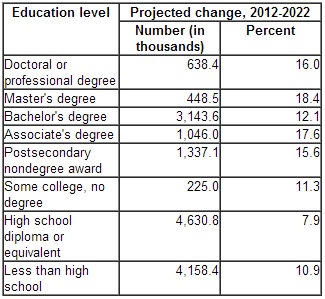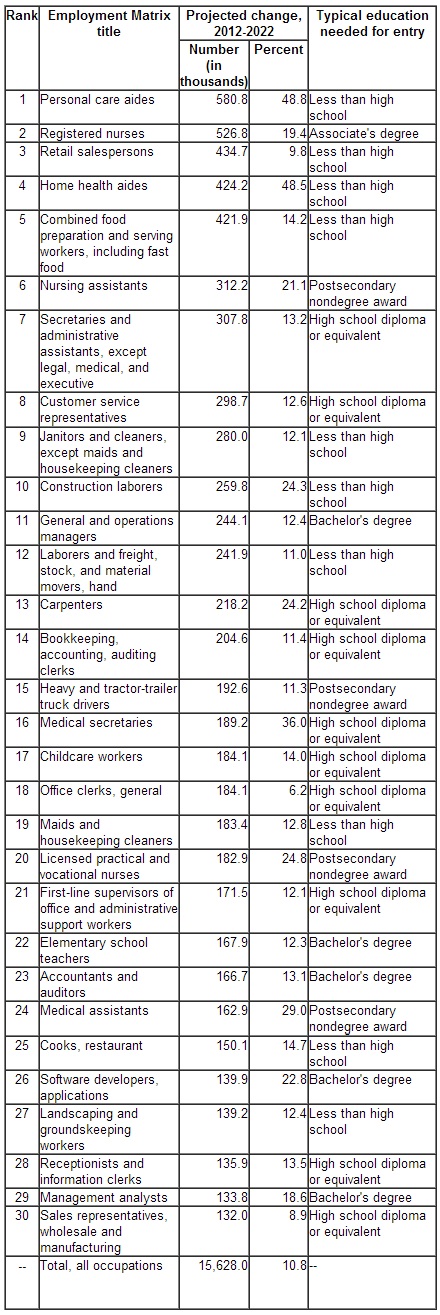Publisher's Note: These posts, by Dr. Terry Stoops, and aptly titled CommonTerry, appears courtesy of our friends at the John Locke Foundation. A full account of Dr. Stoops's posts, or him mentioned as a credible source, are listed here in BCN.
Want a job? Don't go to college
According to the U.S. Bureau of Labor Statistics, few of the fastest growing occupations require a four-year or graduate degree for entry. In this week's CommenTerry, I discuss implications of their findings for North Carolina.
In a 2010 episode of The Simpsons, Lisa Simpson introduces school bully Nelson Muntz to billionaire Facebook founder Mark Zuckerberg. Lisa hopes that the meeting will convince Nelson that college is a good investment. But the plan backfires. The exchange is classic Simpsons:
Lisa Simpson:
Mr. Zuckerberg, I'm Lisa, and this is my friend Nelson.
Nelson Muntz:
S'up, Zuck?
Mark Zuckerberg:
[Typing] Mark Zuckerberg is... happy to make new friend.
Lisa Simpson:
That's nice. Mr. Zuckerberg, I want to show my friend the importance of a college education.
Mark Zuckerberg:
Actually, I dropped out of Harvard.
Lisa Simpson:
You did?
Nelson Muntz:
Better earnin' than learnin'.
Mark Zuckerberg:
Hell, yeah! I'll get the best kind of degree: honorary, baby!
Obviously, billionaire college dropouts, including Zuckerberg, Microsoft founder Bill Gates, and a number of other entrepreneurs, are exceptions to the rule. Nevertheless, Lisa's assumption -- that a college education is necessary and sufficient to be successful -- is both common and flawed. In fact, according to U.S. Bureau of Labor Statistics (BLS) projections, those who decide to enter the workforce without four-year degrees will have more employment opportunities than those with them.
BLS analysts predict that jobs requiring a high school diploma or less will be plentiful in the next decade (See Facts and Stats below). Of the top thirty occupations, only six require an associate's or bachelor's degree for entry. Only two of those occupations, registered nurses and general and operations managers, are among the top twenty occupations projected to add the highest number of jobs through 2022.
These figures should change the way that North Carolinians think about education reform and workforce development. There will continue to be a strong market for college graduates who possess specific skills, such as nursing, business management, accounting, teaching, and computer programming. Our community colleges and universities should continue to invest scarce resources in professional training and degree programs that correspond to the needs of our workforce. While such investment does not preclude support for other academic disciplines, funding priorities should, in part, reflect the supply and demand for qualified workers in specific fields.
If our high schools remain the primary pipeline for workers in high-demand fields, then we need to ensure that our K-12 schools provide baseline skills and knowledge to all students. And there is nothing particularly "21st century" about what children should know and be able to do upon entering the workforce. They should possess adequate literacy and computational skills. They should know basic facts about the world around them. They should be able to use those facts to think, write, and speak critically and analytically. Beyond those fundamentals, public school students should have opportunities to pursue vocational or advanced training in preparation for a career after graduation.
Implicit in these efforts is the need to dispel the myth that all high school graduates should pursue college degrees. George Leef, the director of research at the Pope Center for Higher Education Policy, calls it the "overselling of higher education." Leef argues that degree and non-degree programs offered at community colleges and technical institutes would better serve the many ill-prepared students who enroll in four-year institutions.
Leef's proposal is a win-win-win situation. These students would not incur massive student loan debt and, according to the BLS, would have plentiful employment opportunities for years to come. Taxpayers would not be compelled to subsidize students' (often futile) pursuit of a four-year degree. Employers would enjoy a larger, arguably better prepared, pool of candidates from which to hire. Unfortunately, the overselling continues, and our workforce may suffer because of it.
Facts and Stats
Table 1. Projected employment growth by educational requirement
 Table 2. Occupations with the largest numeric projected growth in jobs
Table 2. Occupations with the largest numeric projected growth in jobs

Source for both tables: Emily Richards and Dave Terkanian, "Occupational employment projections to 2022," U.S. Bureau of Labor Statistics, Monthly Labor Review, December 2013, http://www.bls.gov/opub/mlr/2013/article/occupational-employment-projections-to-2022.htm.
Education Acronym of the Week
BLS -- Bureau of Labor Statistics
Quote of the Week
"The most new jobs projected for 2022 are expected to be in occupations requiring a high school diploma or equivalent. These occupations are projected to add 4.6 million new jobs. About a quarter of these new jobs will be in healthcare and social assistance. Another major area of projected growth for people with a high school diploma or equivalent is construction, which is expected to add almost 1 million jobs as construction regains jobs lost during the 2007-2009 recession."
- Emily Richards and Dave Terkanian, "Occupational employment projections to 2022," Monthly Labor Review, December 2013
Click here for the Education Update archive.
























